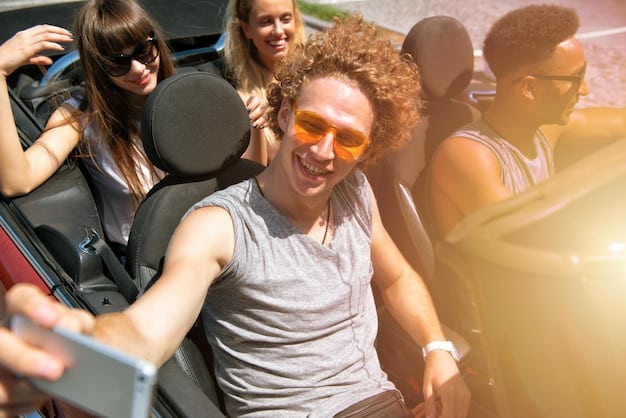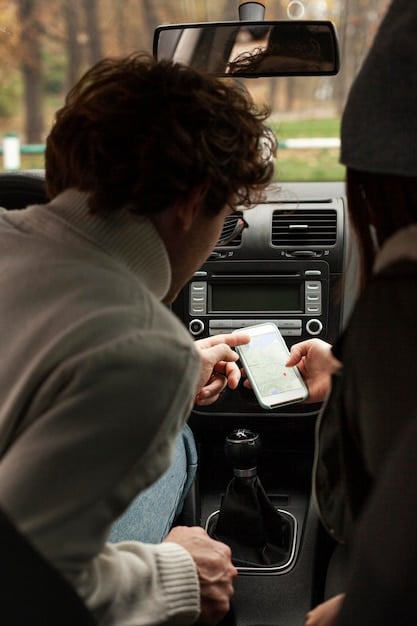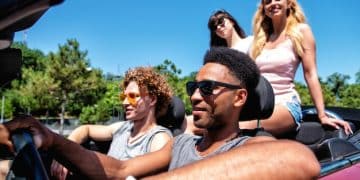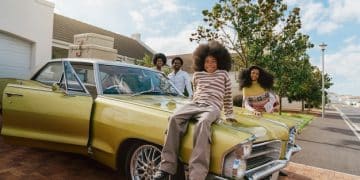Automotive Influencers: Shaping Car Culture on Social Media Platforms

The rise of automotive influencers is revolutionizing car culture on social media by providing enthusiasts with engaging content, shaping consumer preferences, and transforming traditional marketing strategies within the automotive industry.
The world of car culture is rapidly evolving, thanks in large part to the influence of social media. The rise of automotive influencers: shaping car culture on social media platforms has transformed how enthusiasts connect, share their passion, and make purchasing decisions.
The Digital Shift in Car Culture
Car culture has traditionally been defined by physical gatherings, such as car shows, races, and local meets. However, the digital era has introduced a new dimension, where online personalities shape opinions and set trends. Automotive influencers have become pivotal figures in this shift, connecting with audiences in ways traditional media cannot.
The Role of Social Media Platforms
Platforms like Instagram, YouTube, TikTok, and Facebook provide automotive influencers with the tools to create and share content with vast audiences. Each platform offers unique opportunities to engage with car enthusiasts.
- Instagram: Visual platform ideal for showcasing car builds and lifestyle content.
- YouTube: Perfect for in-depth reviews, DIY tutorials, and vlog-style content.
- TikTok: Favored for short, engaging videos that highlight automotive trends and challenges.
- Facebook: Used to build communities and share news, events, and discussions.
Social media’s accessibility and interactivity allow influencers to build direct relationships with their followers, fostering a sense of community and trust.
In conclusion, the digital shift in car culture has been significantly influenced by the rise of automotive influencers, who leverage social media platforms to connect with enthusiasts, share engaging content, and shape opinions in ways traditional media could not achieve.

Who Are Automotive Influencers?
Automotive influencers are individuals who have built a significant following on social media by creating content related to cars. They range from professional racers and mechanics to everyday enthusiasts sharing their passion for automobiles.
Types of Automotive Influencers
The landscape of automotive influencers is diverse, with various niches and content styles.
- Reviewers: Provide unbiased reviews of new and used cars, focusing on performance, features, and value.
- Builders: Showcase custom car builds and modifications, often with detailed tutorials and behind-the-scenes content.
- Enthusiasts: Share their personal car ownership experiences, including maintenance tips, road trips, and car meet coverage.
- Racers: Document their racing careers, providing insights into the world of competitive motorsports.
Each type of influencer caters to a specific audience, offering unique perspectives and expertise.
In summary, automotive influencers come from diverse backgrounds, each bringing unique expertise and perspectives to the world of car culture. From professional reviewers and builders to passionate enthusiasts and racers, these individuals shape opinions, inspire followers, and contribute to the ever-evolving automotive landscape.
The Impact on Consumer Behavior
Automotive influencers wield considerable influence over consumer behavior, particularly among younger demographics. Their authentic and relatable content resonates with audiences seeking genuine opinions and advice.
How Influencers Shape Purchasing Decisions
Influencers impact consumer behavior through various means, creating a significant effect on the automotive market.
- Product Reviews: Influencers offer hands-on evaluations of cars, parts, and accessories, influencing purchasing decisions.
- Brand Partnerships: Collaborations with automotive brands provide influencers with opportunities to promote products and services directly to their audience.
- Lifestyle Integration: Influencers integrate cars into their daily lives, showcasing the practical and emotional aspects of car ownership.
Influencers enhance brand reputation, drive product sales, and foster customer loyalty by providing relatable content and expert opinions that traditional advertising often lacks.
In conclusion, automotive influencers significantly impact consumer behavior by providing authentic, relatable content that shapes purchasing decisions. Through product reviews, brand partnerships, and lifestyle integration, they foster customer loyalty and enhance brand reputation, thereby transforming the automotive market.

Transforming Automotive Marketing
Traditional automotive marketing strategies are evolving to incorporate the influence of social media personalities. Brands are now recognizing the value of partnering with influencers to reach wider audiences and build trust.
The Shift from Traditional to Digital Marketing
The shift from traditional to digital involves new strategies and perspectives on consumer engagement.
- Influencer Marketing Campaigns: Automotive brands collaborate with influencers to create sponsored content, leveraging their reach and credibility to promote products.
- Social Media Advertising: Brands utilize social media platforms to target specific demographics with tailored advertising campaigns.
- Content Marketing: Creating informative and engaging content, such as blog posts, videos, and social media updates, to attract and retain customers.
These new methods help brands cut through the noise and connect with consumers on a more personal level.
In summary, the shift from traditional to digital marketing in the automotive industry involves integrating influencer marketing campaigns, social media advertising, and content marketing. These strategies enable brands to connect with consumers on a personal level, build trust, and effectively promote products while adapting to the evolving digital landscape.
Challenges and Criticisms
The rise of automotive influencers is not without its challenges and criticisms. Transparency, authenticity, and ethical considerations are significant concerns in the influencer marketing landscape.
Addressing Concerns in the Influencer Space
Critical concerns include misleading endorsements and lack of disclosure.
- Transparency and Disclosure: Influencers need to clearly disclose sponsored content to maintain transparency with their audience.
- Authenticity: The need for influencers to remain genuine and honest in their opinions, avoiding the appearance of solely promoting products for financial gain.
- Ethical Considerations: Challenges in ensuring the content promotes safe driving habits and responsible car ownership.
Compliance with advertising standards and guidelines is essential.
In conclusion, addressing concerns in the automotive influencer space requires transparency, authenticity, and ethical conduct. Influencers should clearly disclose sponsored content, remain genuine in their opinions, and promote safe driving habits. By adhering to advertising standards and guidelines, they can maintain the trust of their audience and contribute to a more responsible and credible influencer marketing landscape.
The Future of Automotive Influencers
The future of automotive influencers is poised for continued growth and evolution. Emerging technologies and changing consumer preferences will further shape the landscape of car culture.
Anticipating Trends and Innovations
Key trends include virtual reality experiences, personalized content, and AR applications.
- Virtual Reality: Immersive experiences that let enthusiasts virtually explore and test drive cars from their homes.
- Personalized Content: Content tailored to individual preferences, providing customized recommendations and experiences.
- AR Applications: Augmented reality applications that enhance car shopping and ownership experiences with interactive information and visualizations.
These innovations will provide new creative ways for influencers to connect with followers.
In conclusion, the future of automotive influencers is primed for continued growth and evolution, driven by emerging technologies and shifting consumer preferences. Virtual reality experiences, personalized content, and augmented reality applications are key trends that will offer influencers creative ways to connect with followers, enhancing car culture and shaping the automotive industry’s digital landscape.
| Key Point | Brief Description |
|---|---|
| 🌟 Digital Shift | Social media revolutionizes car culture. |
| 🚗 Influencer Types | Reviewers, builders, enthusiasts, racers. |
| 💰 Consumer Impact | Influencers shape purchasing decisions. |
| 📈 Mkt Transformation | Brands shift to influencer marketing. |
FAQ
▼
An automotive influencer is an individual who has built a large following on social media by creating content related to cars. They share reviews, builds, and personal experiences.
▼
It depends on the content. Instagram works great for visuals, YouTube for detailed reviews, and TikTok for quick, engaging videos. Each platform has its strengths.
▼
Influencers build trust and authority, guiding their audience’s purchasing decisions through authentic reviews and showcasing car ownership experiences.
▼
Key challenges include maintaining transparency, ensuring authenticity, and adhering to ethical guidelines to promote responsible car content.
▼
The future will include immersive virtual reality experiences, personalized content, and use of augmented reality to enhance the car shopping and ownership experience.
Conclusion
In conclusion, the rise of automotive influencers has profoundly reshaped car culture on social media platforms. These influencers not only provide enthusiasts with engaging content but also significantly influence consumer behavior and transform traditional marketing approaches within the automotive industry. As technology evolves, their role will continue to expand, promising more innovative ways to connect with car lovers and shape the future of automotive culture.





